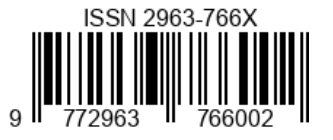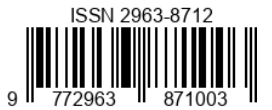Analisis Faktor-Faktor yang Memengaruhi Niat Beli pada Makanan Restoran Jepang Bersertifikat Halal MUI
DOI:
https://doi.org/10.55606/jupiman.v2i3.2351Keywords:
Subjective norm, perceived behavioral control, religiosity, attitude, Japan restaurant food, purchase intentionAbstract
This study aims to determine the effect of subjective norms, perceptions of behavioral control, religiosity, and attitudes on Muslim consumers' purchase intentions on food from MUI-certified Japanese restaurants. The population in this study refers to all Muslim people in Indonesia who know Japan restaurant food is halal certified by the MUI with a total sample of 170 respondents and 42 respondents for the pre-test. The sampling method in this study used a non-probability sampling method with purposive sampling and convenience sampling because sampling was carried out by taking subjects based on certain criteria not based on strata, random or region and distributed based on the convenience of the researcher. This study uses a quantitative approach by distributing questionnaires using Google forms online through social media such as WhatsApp, Line and Instagram. This study uses structural equation model analysis or SEM (Structural Equation Modeling) which is processed using SmartPLS software. The results of data analysis in this study indicate that subjective norms and perceptions of behavioral control have a positive and significant effect on purchase intentions. Religiosity has a positive and significant effect on attitudes. And there is no influence between religiosity and attitude towards purchase intention.
Downloads
References
Abd Rahman, A., Asrar Haghighi, E. dan Ab Rahman, S. (2015). Consumers and Halal cosmetic products: knowledge, religiosity, attitude and intention. Journal of Islamic Marketing, 6 (1), 148-163.
Abdullah, T., & Ireland, J. J. (2012). Halal products: the views of Muslim consumers across Malaysia. International Business and Entrepreneurship Development, 6(3/4), 260. https://doi.org/10.1504/JIBED.2012.049794
Ajzen, I., dan Fishbein, M. (1985). The Theory of Planned Behavior. Organizational Behavior and Human Decision Processes, 50, 179-211.
Al-Nahdi, T. S. M., Ismail, I., Haron, H., dan Islam, A. (2008). Intention to patronage halal restaurants among Malaysian Muslims: an issue of halal perception. Master Thesis Universiti Sains Malaysia,Penang.
Alam, S.S. dan Sayuti, N.M. (2011). Applying The Theory of Planned Behavior (TPB) in halal food purchasing. International Journal of Commerce and Management, 21 (1), 8-20.
Albari, dan Liriswati, A. (2004), Analisis Minat Beli Sabun Cair Lux, Biore dan Lifebuoy di Kotamadya Yogyakarta Ditinjau dari Pengaruh Sikapnya Setelah Melihat Iklan Televisi dan Norma Subyektif. Jurnal Siasat Bisnis, 2 (9), 215-239.
Ali, A., Ali, A., Xiaoling, G., Sherwani, M. dan Hussain, S. (2018). Expanding the theory of planned behaviour to predict Chinese Muslims Halal meat purchase intention. British Food Journal, 120 (1), 2-17.
Amalia, F.A., Sosianika, A., dan Suhartono, D. (2020). Indonesian Millennials’ Halal food purchasing: merely a habit?. British Food Journal, 122 (4), 1185-1198.
Awan, H. M., Siddiquei, A. N., & Haider, Z. (2015). Factors affecting Halal purchase intentionevidence from Pakistan’s Halal food sector. Management Research Review, 38(6). https://doi.org/10.1108/MRR-01-2014-0022
Bailey JM, Sood. J. (1993). “The effects of religious affiliation on consumer behavior: a preliminary investigation”. Journal of Managerial Issues 3(3), 328–352.
Bashir, A.M., Bayat, A., Olutuase, S.O. dan Abdul Latiff, Z.A. (2019). Factors affecting consumers’ intention towards purchasing Halal food in South Africa: a structural equation modelling”. Journal of Food Products Marketing, 25 (1), 26-48.
Bonne, K., Vermeir, I., Bergeaud-Blackler, F. dan Verbeke, W. (2007). Determinants of halal meat consumption in France. British Food Journal, 109 (5), 367-386.
Chi, H., Yeh, H. R., dan Yang, Y. (2011). Applying Theory of Reasoned Action and Technology Acceptande Model to Investigate Purchase Behavior on Smartphone. Journal of International Management Studies, 6 (3), 1-11.
Daneshpour, M. (1998). Muslim families and family therapy. Journal of marital and family therapy, 24(3), 355-368.
Databoks.katadata.co.id. (2021, 30 September). Sebanyak 86,88% Penduduk Indonesia Beragama Islam. Diakses pada 2 Maret 2022, dari https://databoks.katadata.co.id/datapublish/2021/09/30/sebanyak-8688-penduduk-indonesia-beragama-islam
Fandos, C. dan C. Flavian (2006). Intrinsic and Extrinsic Quality Attributes, Loyalty and Buying Intention: an Analysis for a PDO Product. British Food Journal, 108 (8), 646-662.
Hair, J. F., Jr., et. al. (2008). Multivariate Data Analysis with Reading, 4rd Edition, Prentice-Hall International Inc., New Jersey.
Hair, J., Black,W., Babin, B., dan Anderson, R. (2010). Multivariate Data Analysis, (Vol.7)
Hair, J., Hult, M., Ringle, M., dan Sartedt, M. (2017). A Primer on Partial Least Squares Structural Equation Modeling (PLS-SEM). A Primer on Partial Least Squares Structural Equation Modeling (PLS-SEM). Second Edition.
https://halalmui.org/pengenalan-sertifikasi-halal/
Iranmanesh, M., Mirzaei, M., Parvin Hosseini, S.M. dan Zailani, S. (2019). Muslims’ willingness to pay for certified Halal food: an extension of the theory of planned behavior. Journal of Islamic Marketing, 11 (1), 14-30.
Ireland, J. dan Rajabzadeh, S.A. (2011). UAE consumer concerns about halal products. Journal of Islamic Marketing, 2 (3), 274-283.
Khan, A., Arafat, M.Y., dan Azam, M.K. (2020). Role of halal literacy and religiosity in buying intention of halal branded food products in India. Journal of Islamic Marketing. 13(2), 287–308.
Kim, E., Ham, S., Yang I. S.,dan Choi, J. G. (2013). The Roles of Attitude, Subjective Norm, and Perceived Behavioral Control in the Formation of Consumers’ Behavioral Intentions to Read Menu Labels in the Restaurant Industry. International Journal of Hospitality Management, 35, 203-213.
Kusdiana, W., Najib, M. F., & Amalia, F. A. (2021). Pengaruh Religiusitas, Sikap dan Iklan Islami Terhadap Niat Beli Produk Kosmetik Halal Lokal. The 12th Industrial Research Workshop and National Seminar, 978–985
Latif, I. A., Mohamed, Z., Sharifuddin, J., Abdullah, A. M., & Ismail, M. M. (2014). A Comparative Analysis of Global Halal Certification Requirements. Journal of Food Products Marketing, 20(November 2014), 85–101. https://doi.org/10.1080/10454446.2014.921869
Mansour, I. H. F., dan Diab, D. M. E. (2016). The relationship between celebrities’ credibility and advertising effectiveness: The mediation role of religiosity. Journal of Islamic Marketing, 7(2), 148-166.
Muhamad, N., Leong, V. dan Mizerski, D. (2016). Consumer knowledge and religious rulings on products. Journal of Islamic Marketing, 7 (1), 74-94.
Mukhtar, A. dan Butt, M.M. (2012). Intention to choose halal products: the role of religiosity. Journal of Islamic Marketing, 3 (2), 108-120.
Nirwandar, S. (2021). Indonesia Peringkat Satu Konsumen Makanan Halal Terbesar Dunia, https://www.idxchannel.com/syariah/indonesia-peringkat-satu-konsumen-makanan-halal-terbesar-dunia (diakses 09 November 2021).
Ott, B. B., dan Al-Khadhuri, J. (2003). Preventing ethical dilemmas: understanding Islamic Healthcare Practices. Pediatric Nursing, 29 (3), 227-230.
Rajagopal, S., Ramanan, S., Visvanathan, R. dan Satapathy, S. (2011). Halal certification: implication for marketers in UAE. Journal of Islamic Marketing, 2 (2), 138-153.
Rezai, G., Mohamed, Z., & Nasir Shamsudin, M. (2012). Non‐Muslim consumers’ understanding of Halal principles in Malaysia. Journal of Islamic Marketing, 3(1), 35–46. https://doi.org/10.1108/17590831211206572
Setiawati, L. M., Chairy, C., & Syahrivar, J. (2019). Factors affecting the intention to buy halal food by the millennial generation: The mediating role of attitude. DeReMa (Development Research of Management): Jurnal Manajemen, 14(2), 175-188.
Shim, D. (2006). Hybridity and the rise of Japannese popular culture in Asia. Media, culture & society, 28(1), 25-44.
Suki, N.M., Sulaiman, A., dan Salleh A. (2018). Mediating effect of Halal image on Muslim consumers’ intention to patronize retail stores. Journal of Islamic Marketing, 9 (2), 338-355.
Taylor, S. dan P. Todd. (1995). Decomposition and Crossover Effect in The Theory Of Planned Behavior: A study of Consumer Adoption Intentions. International Journal of Research in Marketing, 12, 137-155.
Vanany, I., Soon, J.M., Maryani, A. dan Wibawa, B.M. (2019). Determinants of Halal-food consumption in Indonesia. Journal of Islamic Marketing, 11 (2), 516–530.








